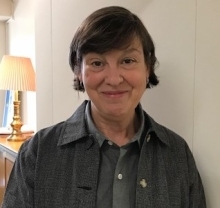Two faculty members in the Department of History are recipients of the National Endowment for the Humanities (NEH) Summer Stipends for research. Associate Professor Kristin M. Szylvian, Ph.D., and Assistant Professor Erika Vause, Ph.D. both received stipends for 2019 and 2020, respectively.
The NEH Summer Stipends program aims to stimulate new research in the humanities and its publication. Summer Stipends support continuous full-time work on a humanities project for a period of two consecutive months, and fund recipients’ compensation, travel, and other costs related to the proposed scholarly research.
Kristin M. Szylvian, Ph.D.: “Operation Breakthrough: George Romney and the Unfulfilled Promise of the American Factory Home”

During the summer 2019, Dr. Szylvian visited the University of Florida in Gainesville, FL to view 135 boxes of federal housing records that are currently stored there. Over a period of days, Dr. Szylvian – who researches federal housing policy – gathered information from the archives about Operation Breakthrough, which began in 1969 as a research endeavor sponsored by the United States Department of Housing and Urban Development (HUD) during the secretariat of George W. Romney.
Inspired in part by his work as President of American Motors Corporation (AMC), Romney worked to industrialize the production of affordable housing through prefabricated homes. Under his leadership, HUD provided grants to 22 companies to produce industrial housing materials. Due to inflation and the Watergate scandal, however, Operation Breakthrough was unable to fulfill its mission.
Dr. Szylvian’s project, “Operation Breakthrough: George Romney and the Unfulfilled Promise of the American Factory Home,” attempts to understand why Operation Breakthrough was widely seen as a failure and how it might have otherwise led to a revolution in affordable housing in America.
According to Dr. Szylvian, Romney’s idea was progressive in imagining the possibilities for high-quality affordable housing. It also included plans for nine prototype communities that were mixed income and racially desegregated.
“Romney’s plan is one that is not really recognized in the literature, but Breakthrough codified guidelines, policies, and procedures for non-discriminatory house practices, including requiring contractors to create jobs for people of color,” she said.
She also sees many ideas of Romney’s ideas about affordable housing persisting today in the growing popularity of “tiny” homes and recycled housing materials like shipping containers, although she notes that these housing alternatives are more popular at the higher end of the market.
As the result of her research, Dr. Szylvian hopes to continue to encourage public and private investment in affordable housing. She is the author of The Mutual Housing Experiment: New Deal Communities for the Urban Middle Class (Temple University Press, 2015) and editor of From Tenements to the Taylor Homes: In Search of an Urban Housing Policy in Twentieth Century America (Penn State University Press, 2000).
Erika Vause, Ph.D.: “Imagining Disaster: Insurance, Citizenship, and Financial Futures in Modern France”

Dr. Vause’s stipend was placed on pause due to the COVID-19 pandemic, but she hopes to be able to undertake her proposed research project during the summer of 2021. A cultural historian of capitalism and finance in late eighteenth to early twentieth century France, Dr. Vause will visit various archives throughout France to view insurance records from that period.
After publishing her first book, In the Red and in the Black: Debt, Dishonor, and the Law in France Between Revolutions (University of Virginia Press, 2018), which traces the history of debt imprisonment and bankruptcy as a means of understanding the changing logic of commercial debt, Dr. Vause began her current research project on insurance. She is investigating how insurance and other financial planning instruments forge a third space between socialism and individualistic capitalism in nineteenth century France.
“French society has a different attitude toward risk and the government’s role in mitigating risk than the American model,” she said. “Insurance is a tool that leverages association; the risk isn’t yours alone to bear.”
With support from the summer stipend, Dr. Vause plans to visit the Bibliothèque nationale de France as well as departmental archives and colonial archives throughout the country.
